|
Printables |
PowerPoints |
Online exercises |
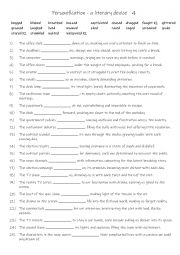
|
B2-C1 Personification - a literary device 4
Learning personification helps students bring their writing to life by giving human qualities to non-human things, making descriptions more engaging and relatable. It enhances creativity, allowing them to craft vivid imagery and evoke emotions in their readers. Understanding personification also deepens their appreciation of literature, as it is a ...
Level: intermediate
Age: 12-100
Type:
Downloads: 141
|
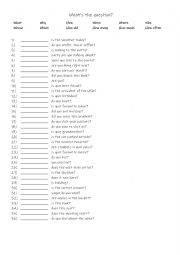
|
What�s the question
Students complete the questions with a suitable question word. Answers are on page 2
Level: elementary
Age: 10-100
Type:
Downloads: 125
|
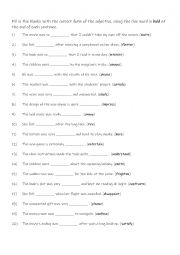
|
B1+ Complete the sentences with the correct form of the adjective -ed or -ing, using the verb form provided in bold font as a clue.
Using the correct form helps ensure that your message is understood as intended. Misusing these forms can lead to confusion or misinterpretation.Native speakers intuitively use these forms correctly, and learning them helps non-native speakers sound more natural and fluent. It�s a step toward mastering nuances in the language.Students fill in the b...
Level: intermediate
Age: 10-100
Type:
Downloads: 124
|
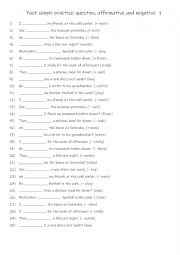
|
A1 Past simple practise with: question, affirmative and negative 1
Learning the past simple tense with questions, affirmative, and negative sentences is essential for students as it enables effective communication about past events. It provides a foundation for understanding grammar and constructing basic sentences, which is crucial for daily conversations. Mastering these forms ensures students can ask questions,...
Level: elementary
Age: 8-100
Type:
Downloads: 102
|
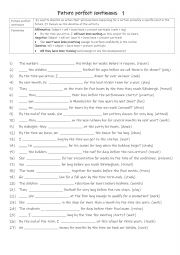
|
B1+-B2 Future perfect continuous 1
Students should learn the future perfect continuous because it enables them to express actions that will have been ongoing for a specific duration before a certain point in the future. This tense is particularly useful for discussing long-term plans or commitments (e.g., By next year, she will have been working here for a decade) and for highlighti...
Level: intermediate
Age: 10-100
Type:
Downloads: 113
|
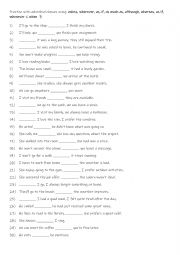
|
A2+-B1 10 Adverbial clauses 3
Learning adverbial clauses using words like unless, wherever, as, if, as much as, although, whereas, as if, whenever and when helps students express complex relationships between ideas, such as condition, time, contrast, and manner. First, students need to familiarise themselves with the 10 adverbial clauses and their use. Then they read the senten...
Level: intermediate
Age: 10-100
Type:
Downloads: 123
|
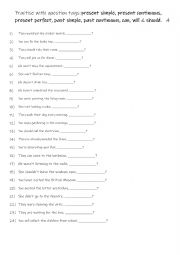
|
A2+-B1 Practise with question tags present simple, present continuous, present perfect, past simple, past continuous, can, will & should. 4
Students familiarise themselves with the tenses and modal verbs, then they read the sentences to work out which one is needed to complete the gap-fill. Answers on page 2.
Level: intermediate
Age: 10-100
Type:
Downloads: 113
|
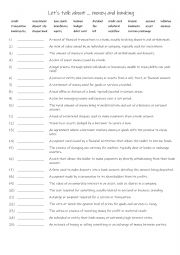
|
B1-B2 Let�s talk about ... money and banking
First, students need to familiarise themselves with the 25 words and their meanings Then they read the definitions to see which one is being described and write that word in the space provided. Answers on page 2.
Level: intermediate
Age: 12-100
Type:
Downloads: 111
|
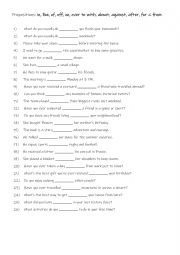
|
Prepositions: in, like, of, off, on, over to with, about, against, after, for & from
This gap-fill prepositions worksheet is suitable for A2-B1 students. Students read the sentences and questions and complete them with one of the eleven prepositions. After the prepositions have been checked, students could use this exercise as a speaking reinforcement component in pairs or small groups.Answers on page 2.
Level: elementary
Age: 10-100
Type: worksheet
Downloads: 111
|
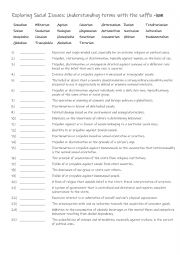
|
B1+ C1 Exploring Social Issues Understanding terms with the suffix -ism
Many "-isms" represent specific ideologies or belief systems (e.g., capitalism, socialism, feminism). Learning about these terms helps you understand the principles and ideas behind these ideologies, which are often significant in political, social, and philosophical discussions.Learning about "-isms" can broaden your intellectual horizons and deep...
Level: advanced
Age: 15-100
Type: worksheet
Downloads: 123
|
|
|
|
|












